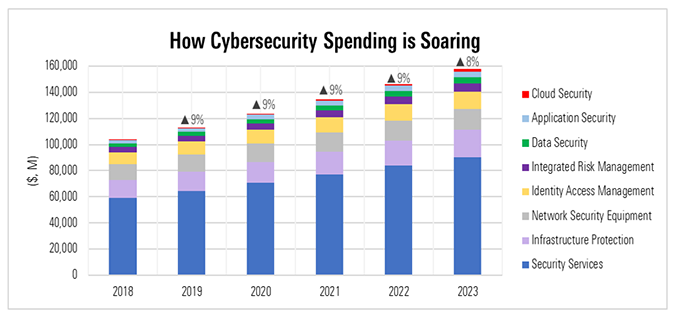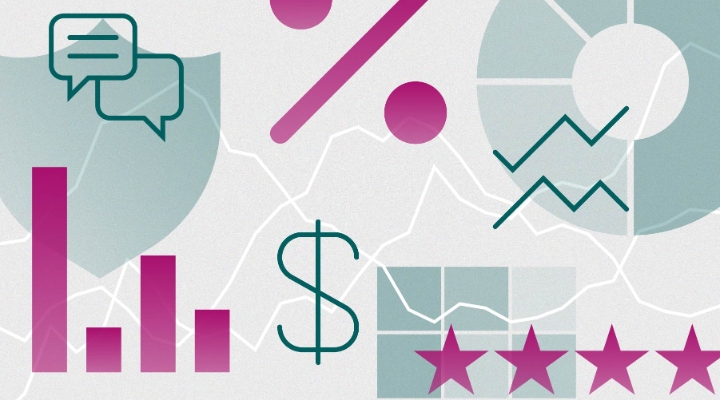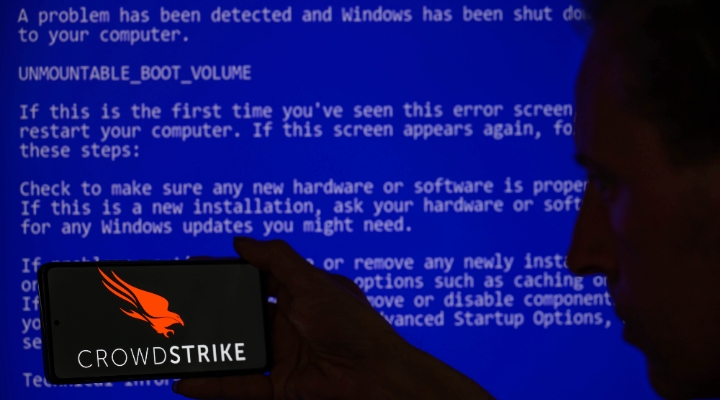
Cybersecurity has become one of the most important areas for companies to spend on in recent years. The theft of data or personal details, or even the taking down of a company website, is one of the biggest threats to businesses across the globe.
The importance of robust cybersecurity has become even more obvious amid the coronavirus pandemic, as the use of technology has ramped up even further. In recent months, high-profile attacks have seen Zoom meeting rooms hacked and Easyjet customer details stolen.
“Some of the cybersecurity stocks are fundamental nowadays,” says Adrian Lowcock, head of personal investing at Willis Owen. “Data has become a valuable commodity. If someone steals your personal data, there are huge consequences on your person as well as stress and potential financial loss.”
The companies that promise to protect against such incident have, unsurprisingly, become a vital tool in any firm's toolkit. Not only do businesses need to safeguard their own interests but they have a responsibility to protect their customers, too. “The beauty of cyber security as a theme is that its customer base is quite broad,” adds Aanand Venkatramanan, head of ETF investment strategies at Legal & General. Indeed, cybercrimes can affect anyone from an individual to a huge organisation; the NHS notoriously fell victim to a ransomware attack in 2017.
Investment Opportunities in Cybersecurity
Rahul Bhushan, manager of the Rize Cybersecurity and Data Privacy ETF, believes cybersecurity is one of the few sectors benefitting greatly from the ongoing Covid-19 crisis. "As the workplace shifts into the cloud, many companies are leveraging the current situation to solidify their businesses,” he says.
Once a niche space, dominated by a handful of disruptors, there are so many facets of cybersecurity that these days there are plenty of stocks to choose from. The four-star rated L&G Cyber Security ETF, for example, has 50 holdings in its portfolio, split across nine buckets: virus and malware protection (stocks such as Avast (AVST)), email encryption (like Mimecast (MIME)), data encryption, cloud, endpoint security, web filtering, biometrics & ID, predictive analytics and consultants. The fund is up more than 21% year to date.
“We want to cover all these key areas,” explains L&G's Venkatramanan, “but of course, some are growing much faster than the others. Virus and malware is quite an old theme.”
Among Venkatramanan’s favourite stocks is Fingerprint Cards (FPQ1), a company that provides biometric recognition software. “It has achieved huge success in phones, and supplies to eight of the top 10 smartphone suppliers,” he says. “Fingerprints have replaced pins and passwords as the way to authenticate, pay and access mobile phones. It has changed the way consumers see biometrics."
The company has recently tapped into biometric payments cards (cards that work with your personal fingerprint), an area which could be about to boom because they are more hygienic - no more tapping a PIN into a grubby keypad - as well as quicker than chip and PIN and safer than simple contactless payments.
The safety aspect is particularly pertinent in the current environment, where the upper limit on contactless payments has been increased in several countries, leading to a rise in fraud. With an estimated 26 billion credit and debt cards in circulation, it's a huge opportunity. "People don’t want to reveal their PIN code or touch the terminal, so contactless transaction have increased. Even in Germany, which is a very cash-dominated society,” says Venkatramanan.

Bhushan, meanwhile, believes our increased reliance on tech in lockdown means internet users are taking more risks on a daily basis, handing over payment details to new companies or accessing new software and websites. In this world, cloud security companies like Okta (OKTA), Crowdstrike (CRWD) and Cloudflare (NET) are clear winners. "One quick look at their reported earnings in quarter one will tell you that," he adds.
How to Invest in Cybersecurity
Morningstar analyst Kenneth Lamont likes three ETFs in this space: L&G Cyber Security, Rize Cybersecurity Data Privacy and iShares Digital Security ETF. He says: “I like the new entrant, Rize Cybersecurity Data Privacy ETF (launched in February), for the purity of exposure to its theme. It uses a tiered index approach, which gives a larger weight to those firms that have a higher revenue from cyber security related activities.”
Among actively managed funds Lowcock likes Polar Capital Technology Trust (PCT) and the Silver-rated Blackrock Global Funds World Technology. These are not “pure cyber-themed funds” but they have traces of the sub-sector in their portfolios. He likes Polar’s managers Ben Rogoff and Nick Evans, who seek new and disruptive technologies: “They combine thematic views with financial analysis to spot high growth companies.” Meanwhile, the Blackrock fund contains disruptive firms that can rapidly capture market share, such as cloud computing provider Twilio.
“It’s clear in today’s digital world that cyber-attacks - especially where personal data privacy violations are concerned - pose an incalculable risk," says Bhushan. "Companies that don't invest in security will lose the trust of their customers. That's a big enough problem even before the hefty fines that companies can expect to be slapped with by the authorities for security breaches."





























